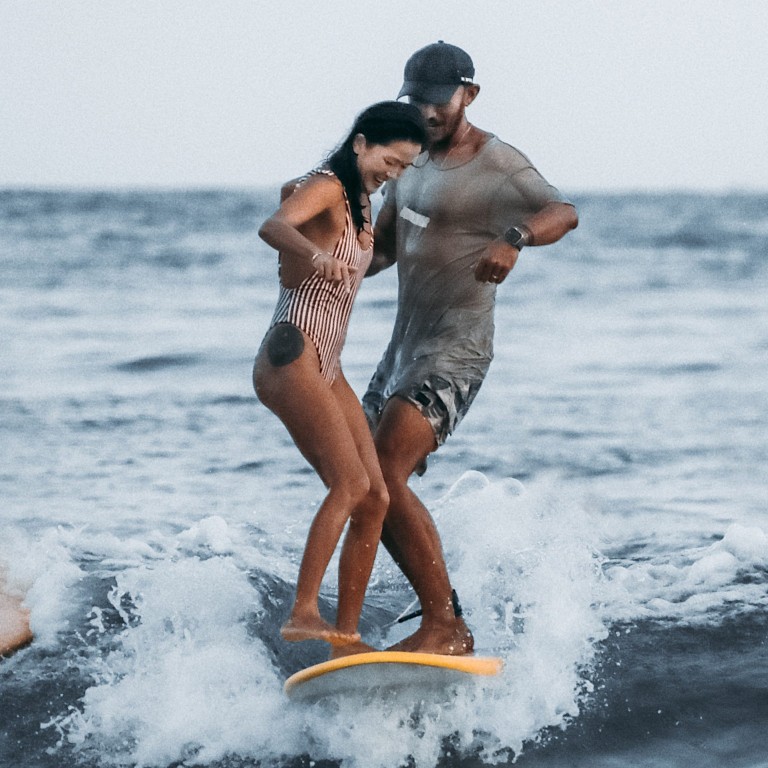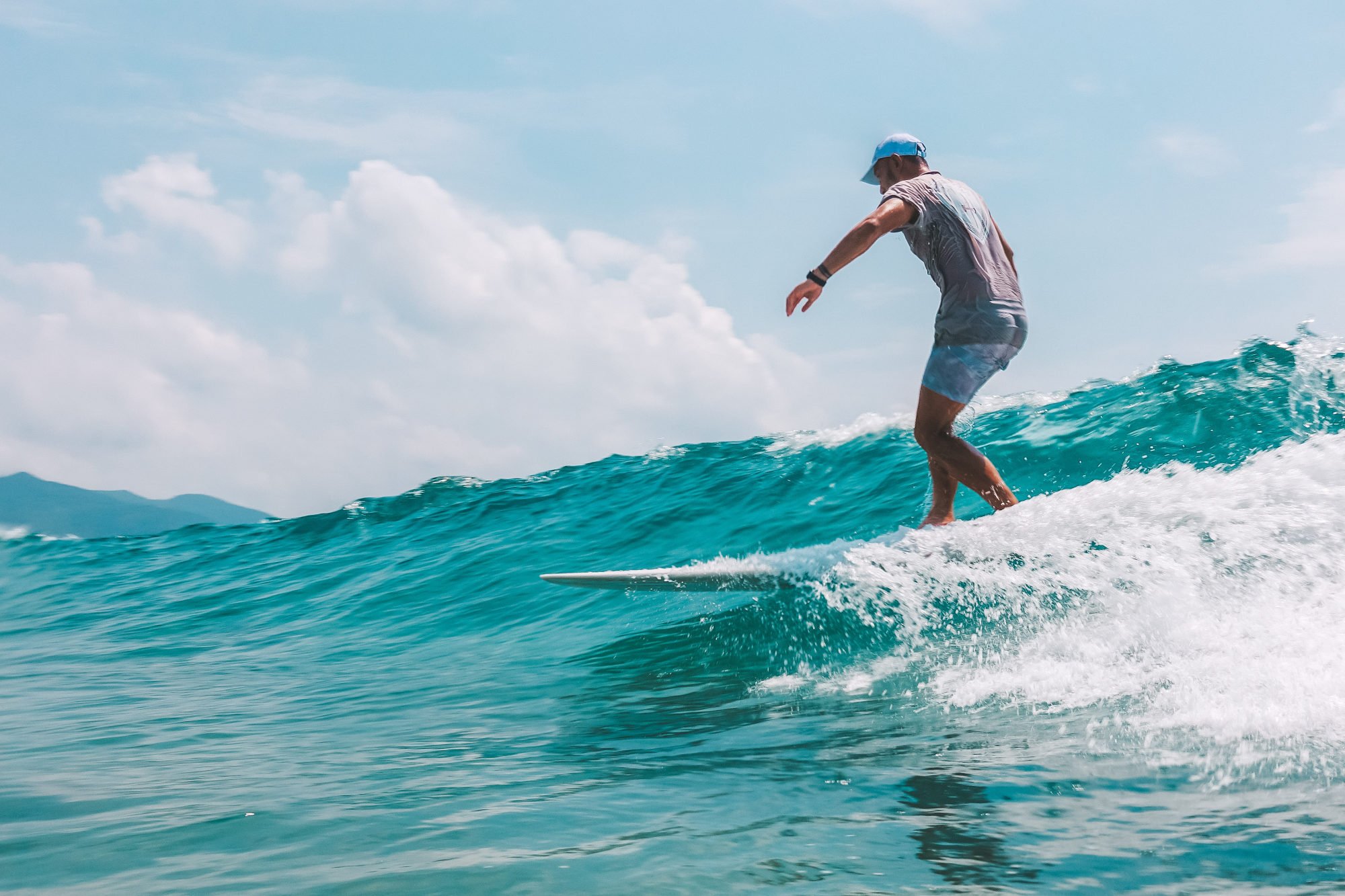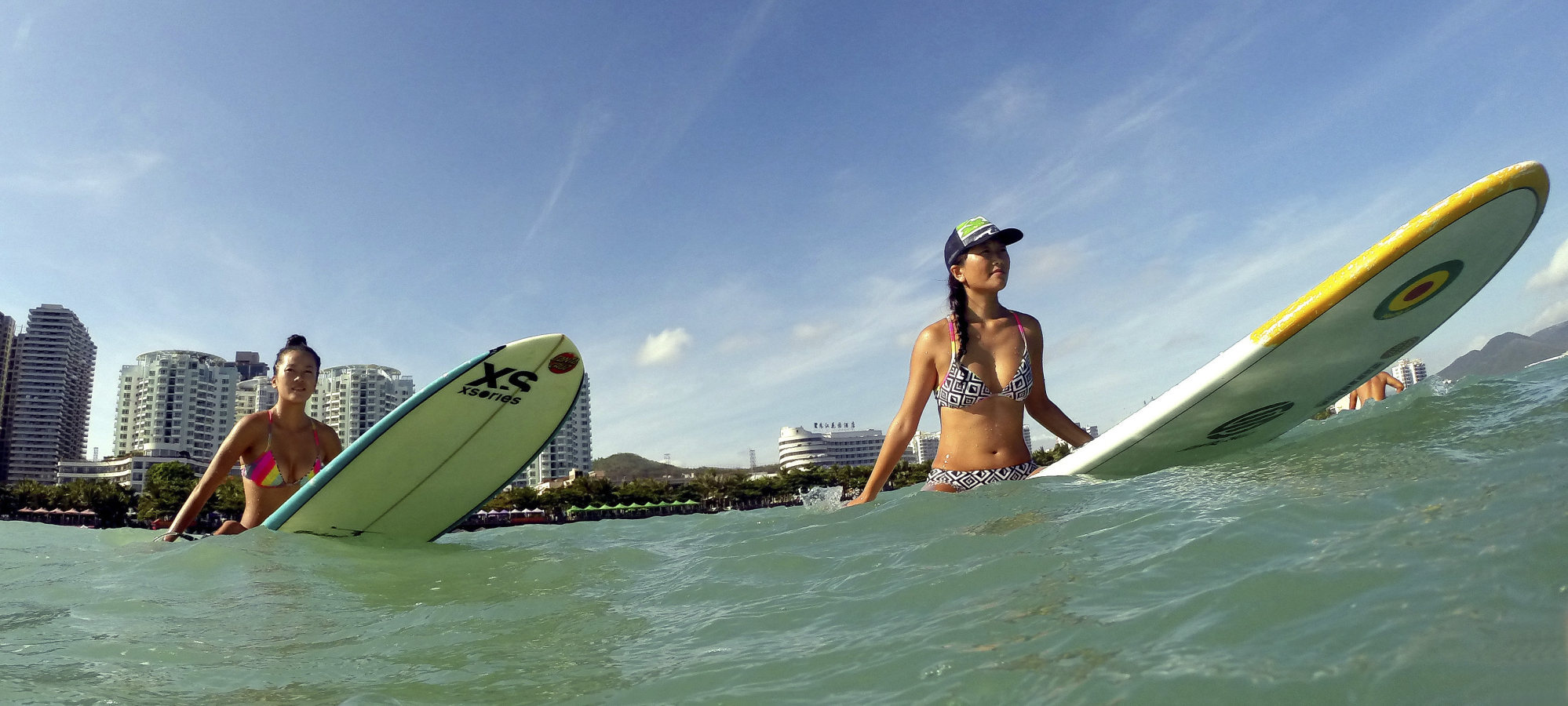
The bikini brigade: Chinese women take up surfing and flock to Hainan to ride the waves
- At surf schools in Hainan the clientele is mostly female. Some surf fans fly in for weekends riding the waves, others have upped sticks and moved to the island
- Actor Wang Yibo learning to surf for a reality-TV show raised the sport’s profile in China, as do social media posts of toned young women on their boards
Close to foam-flecked rocks, where the big waves roar and crash, a posse of China’s elite surfers are in action, performing dizzyingly complex twists, turns and flips on their short boards.
Slightly further down the beach, groups of athletic young women catch gentler waves, hollering with delight when they manage to stand up and gently guide their long boards towards the shore.
This scene plays out daily at Shimei Bay, on Hainan island, where serious wave riders and neophyte surfers share ocean space. In normal times the bay – and other surf spots – are quiet during the smaller-wave months of summer. But the Covid-19 pandemic has ensured a year-round tourism bonanza for Hainan, with a huge boom in surfing, particularly among young women.
Women make up almost three-quarters of the clientele at surf schools run by Justin Tian. A reality-television show featuring heartthrob actor Wang Yibo being coached by Tian gave the surf school bookings a boost, as does the social-media-friendly nature of the sport.

A surfing shot on Weibo or WeChat – the Chinese equivalents of Twitter and WhatsApp – preferably in a colourful bikini, is an ineffably cool image, one that shows your followers that you are sporty, skilled, toned and adventurous.
“It’s mostly women,” says Tian, who runs two surf academies, located at beachside international hotels north of Hainan’s main tourism city, Sanya. Individual lessons cost the equivalent of US$180 for 90 minutes and come with a selection of close-up action photos, shot from the shore by a staff member.
How surfing in Hong Kong keeps you healthy and young at heart
“This young generation of girls like to try a lot of new things; they pay a lot of attention to their bodies to keep fit,” Tian adds. “I think this is what is going on with our society; maybe the guys focus on computer games and don’t do so much workout, or activity.
“The girls always insist on wearing bikinis, even though I warn them that a strong wave, or a fall, could rip it off! I saw a big surge in bookings last year, when we had the reality show.”
Going abroad was nearly impossible in 2020, he adds, and Hainan was the perfect holiday destination for people who wanted to relax in the tropics.

“Before the reality show, people in China people thought surfing was dangerous because movies and ads always show the big waves, not the small waves suitable for learning,” Tian explains. “After the show, people realised it was possible to learn in gentler conditions in their own country.”
Tian, 38, usually heads off to Indonesia on surfing expeditions during the summer months, but last year’s business surge – and the imminent arrival of his first child, Zhiyu, with wife, Niya – meant he stayed put. There are 10 full-time instructors on his school East Coast Surfari’s books, with other, freelance coaches hired on a seasonal basis.
Born in Inner Mongolia, Tian moved to Beijing, where he began working as a salesman. Disillusionment with urban life soon set in and he hatched a plan to move south in search of a less stressful life.
I moved to Hainan so I could focus on surfing and really make it my life. Surfing really puts you in touch with nature, and it’s also a lot of fun, with its own culture
At first, Tian acted as property agent for family-owned flats in Hainan, before managing a backpacker hostel that attracted surfers from near and far. He picked up English from visiting Australian and American surfers and became intrigued by their passionate devotion to the sport.
A woman friend, Fu Rong, helped him learn basic surfing skills on Dadonghai beach, close to Sanya. She is long gone, back to the urban life, and has missed out on the subsequent boom in Hainan surfing which saw women, notably Monica Guo and Darci Liu, become high-profile sporting celebrities.
Guo is originally from the inland town of Yangshuo in Guangxi, southwest China, once a favourite with foreign budget travellers and famed for its karst mountains and photogenic Li River cormorant fishermen.
Seeing the movie Blue Crush, which features Coco Ho, a professional surfer of Chinese heritage, inspired Guo to dream of trying her hand at surfing, an ambition she achieved on a visit to Hong Kong, at Cheung Sha beach on Lantau Island.

“I fell in love with surfing immediately. It was the freedom it offered,” Guo says. “I moved to Hainan so I could focus on surfing and really make it my life. Surfing really puts you in touch with nature, and it’s also a lot of fun, with its own culture. There are more women surfers – it is great to see the sport growing and I am pleased to have played a role in that.”
The vivacious 34-year-old is an embodiment of the physical and mental benefits of surfing. Images of Guo competing at a high level, locally and internationally, encouraged a new generation of women surfers, many of them city dwellers who head south whenever possible. Some hop on a plane to Hainan the minute they leave the office on Friday, ready to spend two days on the ocean.
Shanghai-based product marketer Li Yihui, 29, is one. The sporty executive, who is a free diver and keen hiker, became hooked on surfing after taking lessons with coach Tian.

“Surfing is so addictive,” she says. “When you catch a wave properly it’s like flying above the sea. It is so amazing that when you are in the sea, the waves are cruel and fierce, but when you find the right timing and movements with a simple board you can actually go along with it and leverage the board in a tender, controllable way.”
Li believes Chinese women are increasingly active in all kinds of extreme sports and willing to spend more time getting to know themselves and the possibilities offered by life.
“Surfing requires strong physical attributes and long practising time to understand waves,” she says. “Unlike other board sports such as skateboarding and snowboarding, each wave condition is different and needs a long time to learn the techniques to catch a wave.”
More advanced technical skills are taught by veteran surfer Nik Zanella, who has lived in Hainan for a decade. The Italian, 53, estimates he has surfed 100 days a year for the past 40 years. As well as knowing every surf spot in Hainan, he has also ventured up the Chinese coastline, identifying potential wave-riding locations.

Surf-related projects have provided an income for most of his adult life, including writing for surfing magazines, coaching the Chinese national team and, more recently, advising regional surf teams and assessing local instructors for their suitability as qualified coaches.
Zanella is a surfer with a sinologist pedigree, having studied Chinese language and culture at university, and has written a book, Children of the Tide, that traces the roots of surfing in China during different dynasties.
“It is super interesting anthropologically observing the nuances of a peculiar activity like wave riding entering a culture that has five thousand years of history,” he says. “China is one of the few countries that did not transliterate the word surfing but translated it. They call it chong lang, which means interactive at a deeper level and with unique characteristics.”
When he first arrived in Hainan, the surf culture was nascent. Later came official international competitions at Riyue Bay. The inclusion of surfing in the forthcoming Olympic Games led to a well-funded campaign to train Chinese surfers in the hope of being among the medal-winners.

Even though China’s national team did not qualify for the Tokyo Olympics, the sport now has a strong foothold in the country, with a contingent of international-level competitors. More wannabe surfers are expected to head to Hainan seeking ocean thrills.
“It is a pretty good surfing location,” says the much travelled Zanella, who met his Chinese wife, Yang Li, through surfing. “Hainan relies on the northeast monsoon that produces non-stop waves from November until March, or April, and it is the most reliable wave-producing pattern on the planet.
“I surf because it is a way that we have been given to capture the energy of the ocean and turn it into our own energy. If I don’t do it I am not as good as a father, or as good a husband. I get in the water, collect energy from waves, go back to the beach and use the energy in my own life.”
